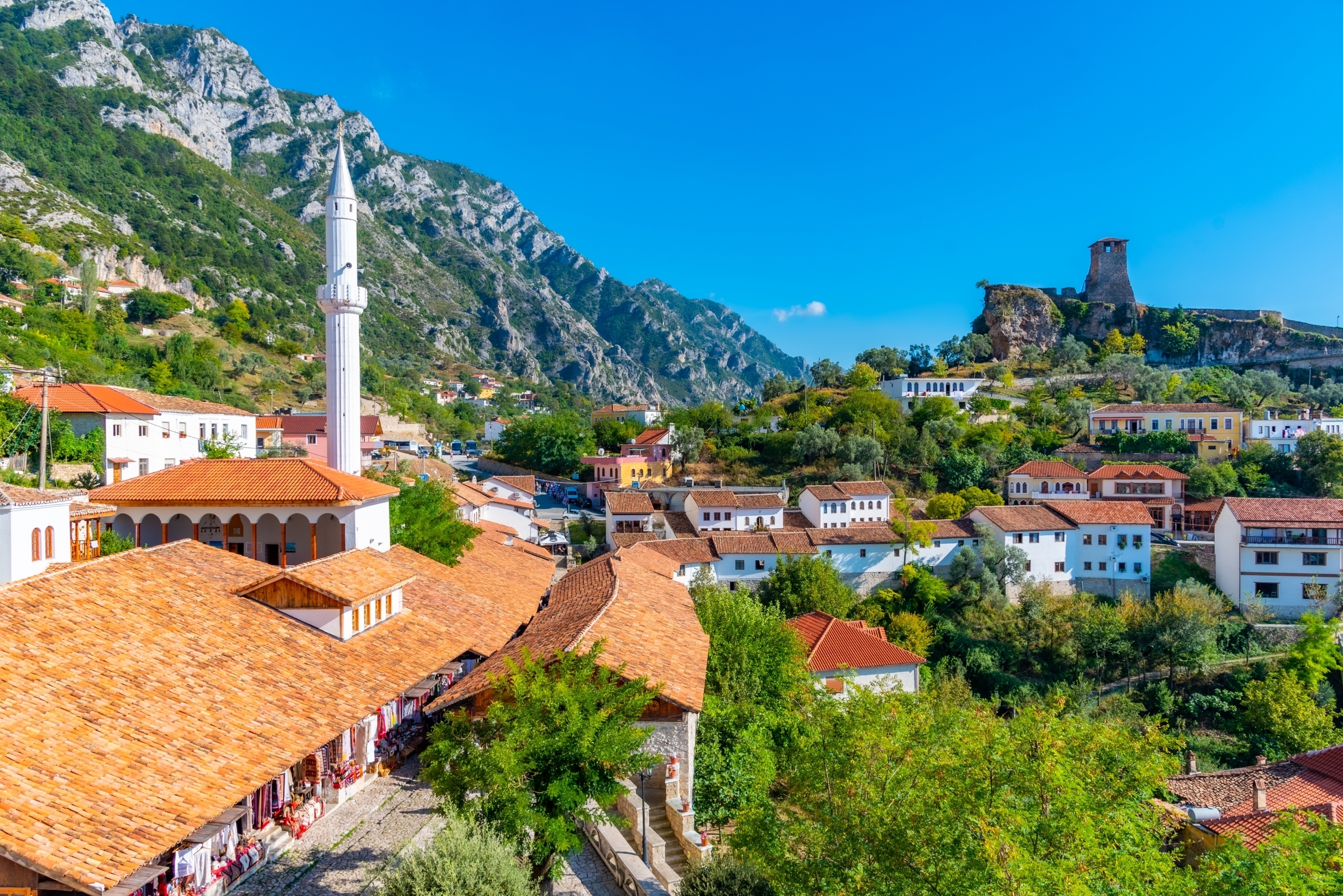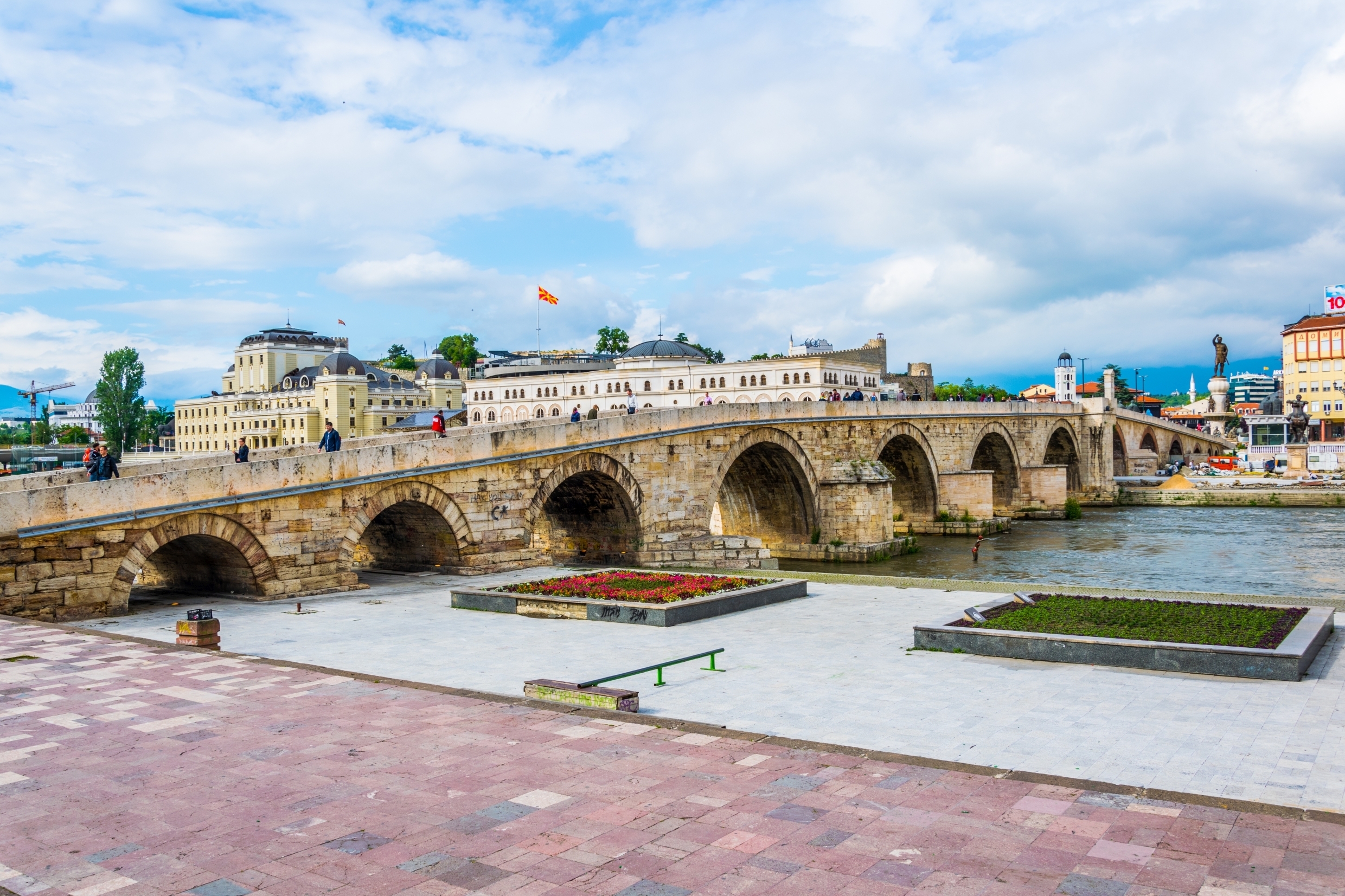Strategic Analysis Balkan Brief
First half of October 2024
Petra Bošková, Anna Gúliková, Kristína Šebová, Dominik Boris, Kristína Piknová, Zuzana Šmilňáková, Lýdia Chobotová, Vanesa Opšenáková

Photo: Shutterstock.com
Albania
Albania’s accessing negotiations with the EU about to open while leaving North Macedonia behind
Albania is about to enter the negotiation process to become one of the potential countries to gain membership in the EU. According to Hungarian PM Viktor Orbán, during the Intergovernmental Conference, which is to be held on October 15, the European Union Common Position shall approve Cluster 1, which must be passed for the negotiations to be opened.
While the first accession talks started in July 2022 with North Macedonia, now during the current Hungarian rotating Presidency of the Council of the EU, the procedural steps required to open the negotiating chapters could be completed in the case of Albania. On October 11, Albanian PM Edi Rama visited Orbán in Budapest to discuss this issue, among other matters, and by doing so, he might have moved up the process for his country.
Unlike North Macedonia, Tirana managed to fulfill the greatest political obstacle, the veto from Greece, by doing multiple reforms in its policies and releasing the detained mayor of Greek ethnicity. However now officially two decoupled processes, North Macedonia’s struggle to come to terms with Bulgaria has had an impact on Albania’s progress for the past two years. Today, it seems that Tirana is going to get a chance to advance if it meets the required criteria.
The Albanian Cluster 1, which must be approved, consists of the fundamental demands for the country and its policy. The most important issues to be solved are law and judiciary, mainly concerning its independence, the anti-corruption campaign, organised crime, and media freedom, as they are the basis of a democratic society. Other dimensions to be reformed include the proper functioning of the state institutions, public administration, and financial criteria for the economic sector. Cluster 1 has its greater role in the EU accessing process and is to determine the whole pace of negotiations yet to be held.
Sources:
- EWB, European Western Balkans, “Albania to open Cluster 1 in the negotiations with the EU on 15 October”, https://europeanwesternbalkans.com/2024/10/11/albania-to-open-cluster-1-in-the-negotiations-with-the-eu-on-15-october/
- Marija Stojanović, European Western Balkans, “After decoupling from Tirana, Skopje is left in a limbo and looking into foreign policy reorientation”, https://europeanwesternbalkans.com/2024/09/30/after-decoupling-from-tirana-skopje-is-left-in-a-limbo-and-looking-into-foreign-policy-reorientation/
- Alice Taylor-Braçe and Georgi Gotev, Euractiv, “Albania’s EU path decoupled from North Macedonia while Skopje remains in limbo”, https://www.euractiv.com/section/politics/news/albanias-eu-path-decoupled-from-north-macedonia-while-skopje-remains-in-limbo/
Bosnia and Herzegovina
Bosnia and Herzegovina Local Elections wit (un)surprising results
On October 6, the local elections took place in Bosnia and Herzegovina. Although the elections were postponed in a few cities because of floods (Kiseljak, Jablanica, Kresevo, Konjic, and Fojnica), it did not have an influence on the expected result, which showed that national parties kept their hold in most of the town halls in Bosnia and Herzegovina.
An interesting result can be considered the win of Milos Vucic in Srebrenica, who is a cousin of the current Serbian president, Alexander Vucic.
On the other hand, national parties did not get the votes only in big cities such as Banja Luka, Zeniva, or Tuzla, but they still had strong support there. In Tuzla, the same mayor was in the last election cycle, Zijad Lugavic.
Banja Luka, which is the biggest city of Republika Srpska, has won Drasko Stanivukovic from the Party of Democratic Progress.
In general, SNSD won 81% of mayoral contests in these elections in the areas which belong to Republika Srpska.
The Croatian Democratic Union still dominates, although it has won 17 mayoral offices, which is three less than in the last election cycle.
Local elections were observed by the Congress of Local and Regional Authorities of the Council of Europe, invited by BIH authorities. This congress contained 25 observers from 20 countries. The Congress claimed that election processes have improved more democratically, but there is a lack of public engagement and awareness. Preliminary findings have already been published on the Council of Europe website. Various observers and CEC have reported irregularities in this election cycle such as buying votes or pressure on voters.
To sum up the whole local elections in Bosnia and Herzegovina, no surprising and “game-changing” results took place and only little changes in city town halls will apply.
Sources:
- Kurtic, Azem. Balkan Insight. Sarajevo.: “Bosnias Big Parties Maintain Grip Outside Cities in Local Elections.”,https://balkaninsight.com/2024/10/07/bosnias-big-parties-maintain-grip-outside-cities-in- local-elections/
- Congress. Council of Europe. Strasbourg.: “Local elections in Bosnia and Herzegovina: improved electoral process but lack of genuine public engagement”, https://www.coe.int/en/web/portal/-/local-elections-in-bosnia-and-herzegovina-improved- electoral-process-but-lack-of-genuine-public-engagement-1

Photo: Shutterstock.com
Montenegro
Propose of the Law on Agents of Foreign Influence
The parliamentary political party For the Future of Montenegro (ZBCG) would like to urgently submit a law on agents of foreign influence to the national parliament. It stated to do so in its statement of October 9, 2024.
In its statement, ZBCG said, “It is up to us to make Montenegro a truly free country, and one of the important steps should be the preparation and adoption of a new law that will regulate the activities of various foreign influence agencies that, under the pretext of non-governmental organisations, try to influence the internal and external policy of our country.” Political parties in Montenegro are obliged by law to present their finances publicly. For the Future of Montenegro said, several NGOs regularly receive millions of dollars from unknown sources. The party goes on to say, “It is only because of the absence of an adequate law that today we have not one, but several ‘NGOs’ in Montenegro, which operate beyond the law, and which give themselves the right to nonchalantly hand out moral lectures and labels to almost all political and state institutions. These agents undermine, deceive and conduct an exact campaign for the needs of the foreign principal for whom they work.”
Eight NGOs (Human Rights Action, Centre for Democracy and Human Rights, Centre for Women’s Rights, Centre for NGO Development, Centre for Democratic Transformation, Media Institute, Lawyers Association, and Association for Responsible and Sustainable Development) state in their response that the adoption of the law is a potential threat to human rights in the country. It may also jeopardise the country’s integration into the European Union. In its reaction to the draft law, the European Movement NGO stated that if the ZBCG’s draft law is adopted, this very party should be banned from operating in Montenegro, as they work for pro-Putin interests.
In response to the concerns raised by NGOs and the opposition, the representative of the Future of Montenegro clarified that they had not yet had the opportunity to consult the draft law. They expressed their desire to model the law after the American system, which requires individuals or organisations representing the views of foreign governments to be registered with the Department of Justice.
Sources:
- B.H., Vijesti, ´ ZBCG: Predlog zakona o agentima stranog uticaja zasnovan na američkom modelu´, https://www.vijesti.me/vijesti/politika/727739/zbcg-predlog-zakona-o-agentima-stranog-uticaja-zasnovan-na-americkom-modelu
- B.R., Vijesti, ´ ZBCG: Urgently propose a law on agents of foreign influence, some NGOs operate outside the law´, https://en.vijesti.me/news-b/politika/727596/zbcg-urgently-propose-a-law-on-agents-of-foreign-influence%2C-some-NGOs-function-outside-the-law
- Za buducnost Crne Gore, Facebook (Post from 9th October 2024), ´ ZBCG: TO URGENTLY PROPOSED A LAW ON AGENTS OF FOREIGN INFLUENCE IN MONTENEGRO!´, https://www.facebook.com/zabuducnostcg/?locale=sr_RS
- Portal Analitika, ´ Evropski savez: Za Budućnost Crne Gore predlaže zakon koji zabranjuje njihovo djelovanje´, https://www.portalanalitika.me/clanak/evropski-savez-za-buducnost-crne-gore-predlaze-zakon-koji-zabranjuje-djelovanje-zbcg
- S.S., Vijesti, ´ Grupa NVO: Inicijativa ZBCG potencijalna prijetnja za ljudska prava´,https://www.vijesti.me/vijesti/politika/727821/grupa-nvo-inicijativa-zbcg-potencijalna-prijetnja-za-ljudska-prava
Kosovo
Kosovo will no longer be represented by UNMIK in CEFTA thanks to the lifting of bans on Serbian imports
On October 8, Kosovo agreed to lift the ban on imports from Serbia at the Merdare border crossing point. This decision only applies to the Merdare border crossing point, as, in the words of the Kosovo PM – Albin Kurti, it is difficult to control what happens between the border and the customs post at other border crossing points.
Kosovo imposed the ban on imports in June 2023 due to security concerns and fears that weapons could be transported across the Serbian border. Now, advanced scanners should help Kosovo with this concern. Before the scanners are installed, trucks passing through Merdare will be strictly controlled. Kosovo has already requested assistance from the United States and the European Union regarding the scanners. Germany has offered to help provide scanners.
This decision opens the way for Kosovo to join the CEFTA (Central European Free Trade) initiative among six Western Balkan countries and Moldova, which promotes free trade and aims to create an EU-like regional free market, where Kosovo has so far been represented by the United Nations Mission in Kosovo (UNMIK). Although it is expected that Kosovo will no longer be officially represented by UNMIK in CEFTA, if this ban is dropped, its name will be spelt as “Kosovo*”. The asterisk will lead to a footnote stating that Kosovo’s representation does not affect UN Security Council Resolution 1244 – reflecting Serbia’s refusal to recognise it as an independent state.
Germany, which has been pressing Kosovo to make this decision in recent weeks, played a significant role in Kosovo’s decision to lift the ban on Serbian imports. Kosovo press reports have spoken of Germany warning Kosovo that it could be excluded from CEFTA, SEPA (Single Euro Payments Area) and the Berlin Process if it does not lift the ban on imports of Serbian goods, which would mean greater isolation for Kosovo.
Reactions from other countries on the step from Kosovo are positive. The European Union supported this move by Kosovo to reduce tensions and promote free trade in the region. The Serbian Prime Minister also welcomed Kosovo’s decision and expressed the view that the decision would ease long-standing tensions between Kosovo and Serbia and facilitate Kosovo Serbs’ access to regular supplies of medicine and food.
Sources:
- Bami, Xhorxhina & Isufi, Antigone. Balkan Insight. Pristina.: „EU Welcomes Kosovo’s Move to Scrap Ban on Serbian Imports“ https://balkaninsight.com/2024/10/08/eu-welcomes-kosovos-move-to-scrap-ban-on-serbian-imports/
- Prishtina Insight.: „Kosovo Gains Regional Free Trade Representation Following Serbian Goods’ Ban Removal“ https://prishtinainsight.com/kosovo-gains-regional-free-trade-representation-following-serbian-goods-ban-removal/
- Ozturk, Talha. Anadolu Ajansi.: „Kosovo lifts import ban on Serbian goods; Serbia welcomes decision“https://www.aa.com.tr/en/europe/kosovo-lifts-import-ban-on-serbian-goods-serbia-welcomes-decision/3354567
Montenegro
Montenegro’s Legislative Response to Cyber Threats
In 2022, Montenegro faced a cyber-attack that caused the temporary shutdown of some public services, which was also considered to be politically motivated after the fall of Abazovic’s government. Cybersecurity expert Alexander Matović stated in September 2024 that in addition to greater investment in education and research in this field, it is also necessary to strengthen the legislative frameworks in the field of cybersecurity and finally bring them in line with EU legislation, stating that the massive cyber attack two years ago is a perfect proof that Montenegro has significant limitations in this area.
A new law to strengthen the country’s cybersecurity has already been passed by the government in May this year and is due to be voted on in parliament by the end of 2024. It should replace the current Law on Information Security (2010) and adapt to European Union standards, but at the moment, there is still an open debate as to whether this law will properly delegate powers among state institutions to fight cyberattacks. In the process of EU accession negotiations, this change in legislation is essential, given Montenegro’s need to meet the requirements under Chapter 10.
The issues under the new law relate primarily to the creation of a new cyber agency to protect IT systems outside the state government, with the CIRT being responsible for the security of the state government. This delegation of powers may later cause problems in the coordination of the system of protection against cyber-attacks, given that within the framework of the law, certain competencies of the two institutions overlap, as pointed out by Ivan Vujović, supervisor for electronic communications within EKIP, and Branko Džakula, an expert in information security, who also has doubts about Montenegro’s ability to implement the new law due to limited resources, as its cyber security index is well below the EU average. Related to this are warnings about the possible unnecessary waste of financial resources if a new cyber agency were to be created and whether strengthening the CIRT would not ultimately be sufficient.
Sources:
- Ivan Ivanovic, Balkan Insight, “Montenegro’s Proposed New Cybersecurity Structure Raises Concerns” , https://balkaninsight.com/2024/10/02/montenegros-proposed-new-cybersecurity-structure-raises-concerns/
- Reuters, “Montenegro’s state infrastructure hit by cyber attack-officials“, https://www.reuters.com/world/europe/montenegros-state-infrastructure-hit-by-cyber-attack-officials-2022-08-26/
- Damira Kalac, Vijesti, “Matović: Increasing danger of hacker attacks“, https://en.vijesti.me/news-b/society/723186/matovic-increasing-danger-of-hacker-attacks

Photo: Shutterstock.com
Serbia
Serbia and Turkey plan to increase military cooperation
On October 11, during a joint meeting between Serbian and Turkish presidents, a plan to increase military cooperation among the countries was hinted at, as potential cooperation on the production of Turkish military drones was discussed. This comes after Serbia´s criticism of the Turkish shipment of their drones to Kosovo several months before.
Erdogan has taken it upon himself to visit the Balkan countries in the first half of October 2024, and in Serbia, he met with his counterpart Vučić. After the meeting, where they signed agreements on cooperation in trade, energy, and emergencies, they both suggested possible cooperation of the countries´ military sectors may be in the works. Serbian President Vučić said that “the Turkish military industry is significantly stronger than ours. But, without false modesty, we are not to be neglected either. Within those frameworks, I see room for great cooperation.” He also added that Serbia is not interested in wars, however, it must have enough power to deter anyone.
When Erdogan was asked whether the joint military industry cooperation would include the production of Bayraktar drones, Erdogan said: “Serbia has certain capacities, we have certain capacities, and as friendly countries, we can develop our capacities together.” Erdogan´s words have been read as confirmation that the drones may be produced, to a certain extent, in Serbia in the future.
Previously, when Kosovo bought the Bayraktar military drones from Turkey, Serbia viewed this purchase critically, accusing Turkey of potential escalation of tensions in the region, and cancelled its plans to purchase the military drones from Turkey. Now, after the joint meeting between Serbia and Turkey, Vučić expressed he has great confidence in Erdogan and his “attitude toward peace and stability” in the Western Balkans.
Sources:
- Dusan Stojanovic, AP, “Turkey and Serbia suggest they might jointly produce military drones”, https://apnews.com/article/serbia-turkey-kosovo-drones-erdogan-vucic-6e6f18b5eb0509b1c3e47988410af1a7
- Radio Free Europe, “Turkey, Serbia Eye Cooperation On Production Of Military Drones”, https://www.rferl.org/a/turkey-serbia-drones-erdogan-vucic-kosovo/33155514.html
North Macedonia
Constitutional Court Scraps the Ethnic Balancer Mechanism
The mechanism used for ensuring ethnic balance in public administration, called the “ethnic balancer”, was terminated by the Constitutional Court of North Macedonia On October 1, 2024. The Court deemed the tool unconstitutional on the grounds of discrimination in the employment. The current Prime Minister, Hristijan Mickoski, from a nationalist party VMRO-DPMNE, announced that the government was ready to draft a new law on equal representation to replace the “ethnic balancer”.
The idea behind the so-called “ethnic balancer” tool stems from the 2001 Ohrid Framework Agreement, which ended an armed conflict led by the militant groups of ethnic Albanians. The agreement established rules to guarantee equal ethnic representation in the country. The “ethnic balancer” is a digital system that calculates the number of employees identifying with both ethnic groups in public institutions. It aims to secure an equal representation of various ethnic groups in every institution. It has functioned for ten years now.
However, the ruling VMRO-DPMNE party has heavily criticised this tool for years. Before this year’s election, the party officially confirmed its intentions to scrap the mechanism. According to the party’s representatives, the “ethnic balancer” is discriminatory since people are not hired on account of their abilities but ethnicity. Furthermore, critics state that equal representation has been achieved at the expense of the efficiency of the public sector, which they claim has become overstaffed. Some claim that the ethnic Albanians affiliated with the Albanian Democratic Union for Integration party (DUI) have disproportionately profited from the tool.
The State Anti-Corruption Agency has also been vocal for years on the issue of the alleged misuse of the system. According to the agency, there have been cases of ethnic Macedonians who declared themselves to belong to another ethnic group to higher their chances of employment in the state sector and vice versa. In connection with these problems, the State Anti-Corruption Agency filed a motion to the Constitutional Court at the beginning of 2024 to review the mechanism.
The Constitutional Court ruled in favour of the agency, stating that hiring based on ethnicity disregards competence and that ethnicity is a personal matter that can be changed and should not be required to be revealed. Out of all the constitutional judges, the three of them who identify as ethnic Albanians voted to dismiss the motion.
Sources:
- Sinisa Jakov Marusic, Balkan Insight, 2024, North Macedonia’s Next Govt Will Struggle to Scrap Ethnic Quotas, https://balkaninsight.com/2024/04/16/north-macedonias-next-govt-will-struggle-to-scrap-ethnic-quotas/
- Sinisa Jakov Marusic, Balkan Insight, 2024, North Macedonia Court Temporarily ‘Freezes’ Ethnic Quotas in Employment, https://balkaninsight.com/2024/09/18/north-macedonia-court-temporarily-freezes-ethnic-quotas-in-employment/
- Bisera Altiparmakova, MIA, 2024, Mickoski on announced equal representation law: Any legislation must be in line with the Constitution, https://mia.mk/en/story/mickoski-on-announced-equal-representation-law-any-legislation-must-be-in-line-with-the-constitution
- Bulgarian News Agency, 2024, North Macedonia Constitutional Court Terminates „Ethnic Balancer“ Mechanism for Hiring in State Administration, https://www.bta.bg/en/news/758205-north-macedonia-constitutional-court-terminates-ethnic-balancer-mechanism-for-

Contact us